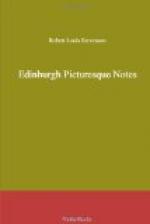grey and silent in a workman’s quarter and
among breweries and gas works. It is a house
of many memories. Great people of yore, kings
and queens, buffoons and grave ambassadors, played
their stately farce for centuries in Holyrood.
Wars have been plotted, dancing has lasted deep
into the night, — murder has been done in its
chambers. There Prince Charlie held his phantom
levees, and in a very gallant manner represented
a fallen dynasty for some hours. Now, all these
things of clay are mingled with the dust, the king’s
crown itself is shown for sixpence to the vulgar;
but the stone palace has outlived these charges.
For fifty weeks together, it is no more than a show
for tourists and a museum of old furniture; but on
the fifty-first, behold the palace reawakened and
mimicking its past. The Lord Commissioner,
a kind of stage sovereign, sits among stage courtiers;
a coach and six and clattering escort come and go
before the gate; at night, the windows are lighted
up, and its near neighbours, the workmen, may dance
in their own houses to the palace music. And
in this the palace is typical. There is a spark
among the embers; from time to time the old volcano
smokes. Edinburgh has but partly abdicated,
and still wears, in parody, her metropolitan trappings.
Half a capital and half a country town, the whole
city leads a double existence; it has long trances
of the one and flashes of the other; like the king
of the Black Isles, it is half alive and half a monumental
marble. There are armed men and cannon in the
citadel overhead; you may see the troops marshalled
on the high parade; and at night after the early
winter even-fall, and in the morning before the laggard
winter dawn, the wind carries abroad over Edinburgh
the sound of drums and bugles. Grave judges
sit bewigged in what was once the scene of imperial
deliberations. Close by in the High Street
perhaps the trumpets may sound about the stroke of
noon; and you see a troop of citizens in tawdry masquerade;
tabard above, heather-mixture trowser below, and
the men themselves trudging in the mud among unsympathetic
by-standers. The grooms of a well-appointed
circus tread the streets with a better presence.
And yet these are the Heralds and Pursuivants of
Scotland, who are about to proclaim a new law of
the United Kingdom before two-score boys, and thieves,
and hackney-coachmen. Meanwhile every hour
the bell of the University rings out over the hum of
the streets, and every hour a double tide of students,
coming and going, fills the deep archways.
And lastly, one night in the springtime — or
say one morning rather, at the peep of day —
late folk may hear voices of many men singing a psalm
in unison from a church on one side of the old High
Street; and a little after, or perhaps a little before,
the sound of many men singing a psalm in unison from
another church on the opposite side of the way.
There will be something in the words above the dew
of Hermon, and how goodly it is to see brethren dwelling
together in unity. And the late folk will tell
themselves that all this singing denotes the conclusion
of two yearly ecclesiastical parliaments —
the parliaments of Churches which are brothers in
many admirable virtues, but not specially like brothers
in this particular of a tolerant and peaceful life.




